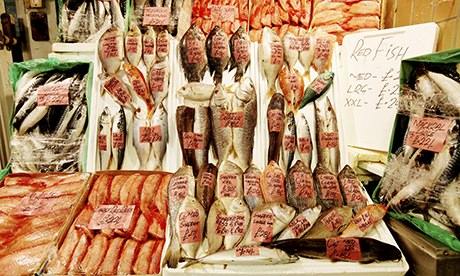Sustainable food chains make business sense and consumers happy
Customers want food they can trust and expect retailers to do the ethical and environmental thinking for them
Sponsored feature
Sponsored feature

Responsible supermarkets are now making moves to ensure the sustainability of all of the fish they sell. Photograph: Graeme Robertson
In a year when horsemeat contamination and food waste have made the headlines, consumers are more conscious about the operation of the food system. Everyone wants food they can trust, but today's shoppers increasingly want more than that, and expect retailers to embed ethical and environmental sustainability in all of their products.
This was one of the messages that came out of a recent progress report by Sainsbury's, two years into its 20x20 sustainability commitments programme.
"Customers want us to act for them and ask the question and take the actions they would expect," said Justin King, chief executive ofSainsbury's, speaking at the launch of the report on 20 November.
"We can help them by taking on that responsibility and solving complex problems for them. Ultimately, the power of 24 million customers shopping with us will always mean we can make a big difference more quickly."
This mainstreaming of sustainability is a response to customers no longer seeing the issue as a bonus feature, sold under a label, such asFairtrade, with a price premium to match. Ethical and environmental sustainability is increasingly seen as fundamental, and consumers expect supermarkets to make it easy for them to live by those principles.
"When surveyed, most shoppers say that, on key ethical food issues, they want their supermarket to make those choices for them, before the product even reaches the shelf," says Kath Dalmeny, policy director of the charity Sustain, which campaigns for better food and farming.
Indeed, shoppers express surprise when they discover their trusted supermarket is selling endangered fish, for example. As Dalmeny says: "The more responsible of the major supermarkets are now making principled and cost-effective moves to ensure the sustainability of all of the fish they sell, to reduce the environmental footprint of products, and to pay fair prices to farmers in poor countries."
One of Sainsbury's commitments under the 20x20 plan, for instance, is for all of its fish to be independently certified as sustainable. It is also about to launch its own set of standards, run by an independent body, covering all of the 35 key raw materials in its supply chain that may not be fully covered by existing standards, such as Fairtrade, the Rainforest Alliance and the Marine Stewardship Council (MSC).
"MSC and Fairtrade are great and we want to be able to say our standards are independently audited across these 35 or so raw materials," said King.
This trend towards embedding sustainability is being seen in other sectors, too. Unilever, for example, introduced a Sustainable Living Planin November 2010, which it describes as "a driver of everything we do so that each time a consumer chooses one of our products, it improves their life, their community and the world we all share".
"Environmental sustainability is starting to be seen as more than an optional extra," says Duncan Williamson, food policy manager at WWF UK. "There are increasing numbers of businesses who are seeing the environment as core to their future business models."
Businesses also see sustainability as a way of engaging with their customers, and the issue of tackling waste lends itself well to this. Food waste is something consumers are increasingly conscious of and want to act on. In early November, the Waste & Resources Action Programme (Wrap) revealed that, since 2007, the UK has reduced avoidable household food waste by 21%.
Many consumers clearly care about this and it may seem counterintuitive for a supermarket to encourage consumers to waste less if it means they'll buy less. But, according to Alice Ellison, environment policy adviser at the British Retail Consortium, this is an important way of creating value. That means selling affordable food, "but also making sure we can make the most of it", she says.
Ellison cites a range of steps taken by retailers to reduce household food waste, from providing clear storage advice and recipe ideas to offering more portion sizes and designing packaging that extends a product's shelf life. "These have helped to drive significant reductions in the amount of food and drink we throw away," she notes.
According to Sainsbury's 20x20 update, the supermarket's Make Your Roast Go Further campaign, in January 2013, was one of its most successful of the year. This substantiates King's argument that there is a business rationale in helping consumers waste less.
"Helping customers spend less by buying and consuming everything they buy is in our long-term interest, if we help you do that better than our competitors … It's not good for us to have someone looking at a bag of salad in the bin thinking 'I was tempted to buy that at Sainsbury's, but I wasted it'."
Brand owners have realised that embedding sustainability into their supply chains and brand propositions is important to their survival, as well as giving customers what they want. The supply and demand sides are coming together under the sustainability agenda, and that's why it makes sense to embrace it.
"It's not just about CSR [corporate social responsibility]," says Williamson. "It's about resilience, and their medium- and long-term future. Companies are recognising that the core elements of the food system – water, land, ecosystem services and oil – are becoming scarcer and will cost more. A sustainable food system will need responsible business."
Credits
This content is brought to you by Guardian Sustainable Business in association with Sainsbury's. Paid for by Sainsbury's. All editorial controlled and overseen by the Guardian.
The book is available on Amazon and Kindle for $4.99 USD. Visit amazon/Kindle to order now:
http://www.amazon.ca/Social-Media-Marketing-Agri-Foods-ebook/dp/B00C42OB3E/ref=sr_1_1?s=digital-text&ie=UTF8&qid=1364756966&sr=1-1
Thanks for taking the time

No comments:
Post a Comment